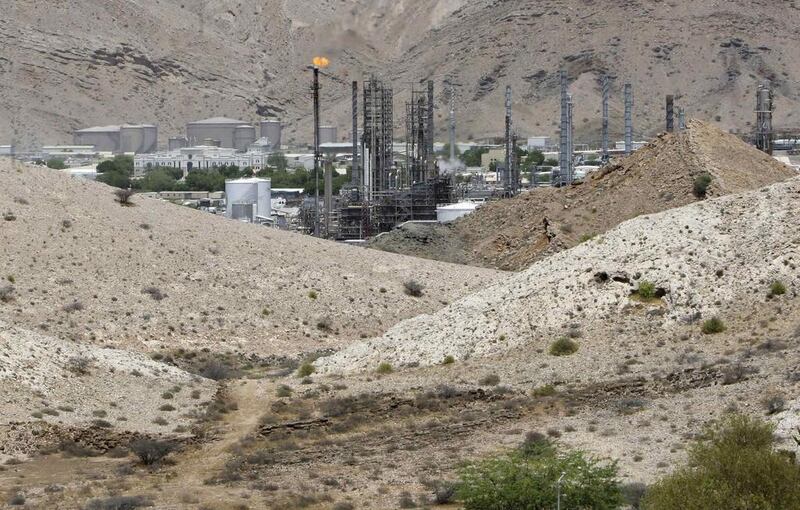MUSCAT // As the price of oil falls, petro-dependent Oman is starting to wonder if its age of comfort is coming to an end.
With smaller reserves than other countries in the Gulf, Oman still relies heavily on oil - the fuel behind its rapid development since 1970. Oil accounted for about 75 per cent of government revenue last year.
But while the current budget assumes an average oil price of US$85 per barrel, the price of Omani oil slipped below $80 this month. The refrain sounding in the capital is dire: "The honeymoon is over."
The phrase comes from a recent post on Twitter by Mohammed Al Busaidi, a member of Oman's Majlis Al Shura, the local parliament.
"Let's tighten our belts and prepare together for the coming challenges," Mr Al Busaidi wrote on November 14. "The honeymoon is over!"
His words have become a slogan that has rocketed around the internet, reawakening a long-running debate about whether Oman's reliance on oil endangers its future. Citizens from around the country are chiming in.
"For these words to come from a member of the Majlis Al Shura - people inside the government, inside the parliament - means that there is great fear from the higher authorities about the decline of oil," said Khalid Al Rashdi, a 28-year-old engineer in Muscat.
For years, Oman has focused on developing alternative sources of income such as tourism and ports. Non-oil exports grew 18.9 per cent from 2010 to 2013, according to the central bank. Still, the hydrocarbon sector made up half of the country's GDP last year.
"I cannot deny that we rely on oil - we rely too much on oil," said Shamsa Al Sheibani, 33, an Omani who works in risk management.
Oman is more vulnerable to falling oil prices than other members of the Gulf Cooperation Council, partly because it has less of a cushion. While exploration continues, total reserves were estimated last year at 5.15 billion barrels. That means that at 2013 production rates of about 940,000 barrels per day, Oman has just 15 years of oil left.
Despite this, spending has risen dramatically since 2011, when the Arab Spring arrived in the streets of Muscat. Authorities responded to scattered unrest by raising wages and creating new public sector jobs. As a result, government expenditures increased 34.8 per cent that year and a further 26.2 per cent in 2012.
The need for Oman to reduce its growth in spending is "urgent", the International Monetary Fund warned last year. The IMF pointed out that Oman's "break-even" oil price - the level required to balance its budget - would rise from $62 in 2008 to a projected $120 in 2018.
The 2015 budget, still under review, includes the highest level of spending in Oman's history, local newspaper Al Zamn reported on Thursday. Based on an oil price of $85, the budget estimates a deficit of 2.5 billion (Dh24bn) Omani riyals, "informed sources" told the newspaper.
Meanwhile, the debate over how falling oil prices will affect regular Omanis continues.
Mutadhid Al Habsi, 21, an Omani student in Edinburgh, said he believed the honeymoon was indeed over.
"Depending on a non-renewable natural resource . puts the country's future in danger if today's lesson about falling prices is not absorbed," he said in an email to The National.
Ms Al Sheibani, however, does not think there was a honeymoon in the first place. Omani ruler Sultan Qaboos bin Said has always emphasised hard work and diversification of the economy, she said.
"He didn't give us the fish and say, just eat, it's a honeymoon, it's a new life," she said. "No, he told us we have to learn how to look into the future with an optimistic view, never give up, and we have to work hard.
"We are not that spoiled," she added. "And we know we have a lot of challenges ahead, and it is normal."
Ms Al Sheibani believes Omanis will adapt to whatever happens. "People are worried of course, because we are entering a new stage and every time when you enter a new stage, ambiguity is there."
Whether or not Oman's "honeymoon" continues, the drop in oil prices is a wake-up call, said Mr Al Rashdi.
"If the honeymoon is over, then the government needs to study alternative choices, instead of oil," he said. "If it isn't over, then it needs to speed up laying out the infrastructure to be an alternative for oil."
To Mr Al Habsi, that means investing more in education and slowing the "export" of educated Omanis to other countries.
"People are the engine and the basis of all growth," he said.
foreign.desk@thenational.ae
Drop in oil price gives Omanis cause for concern
With limited reserves and a high dependence on oil revenues, the recent plunge in prices has triggered a national debate about Oman's future course.

Editor's picks
More from the national




